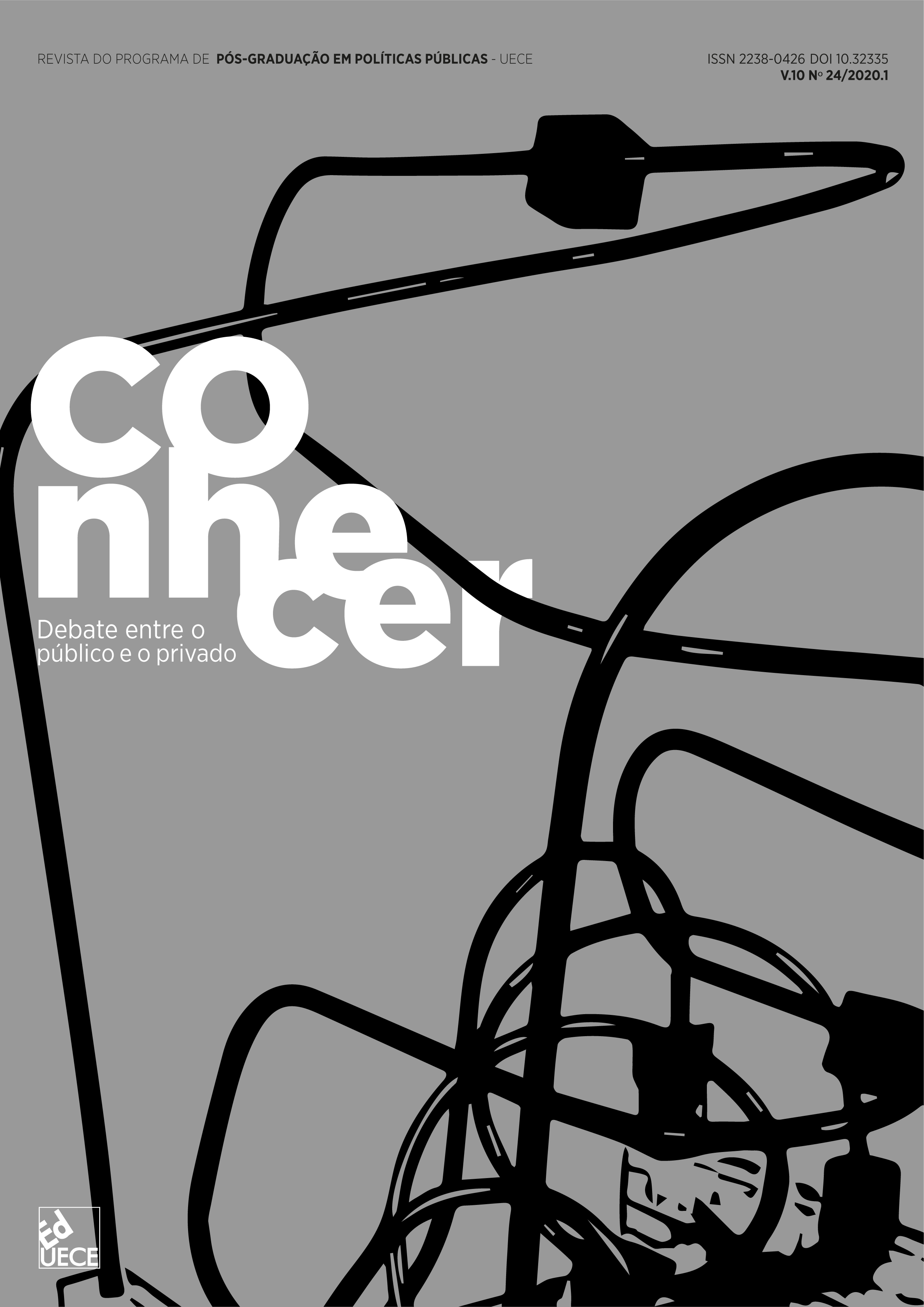Para una historia global del populismo:
rupturas y continuidades
DOI:
https://doi.org/10.32335/2238-0426.2020.10.24.2759Palavras-chave:
populismo, totalitarismo, fascismoResumo
La globalidad histórica del populismo parece ser una paradoja, pues son justamente esos ideólogos nacionalistas y populistas quienes acusan a sus enemigos de “globalistas”, y quienes asimismo se presentan como actores jóvenes, sin antecedentes históricos, o incluso como el resultado de un capítulo nuevo en la historia del mundo, que el propio caudillo actual de la Casa Blanca ha denominado “la era de Trump”. En teoría, los nuevos populistas son nacionalistas extremistas que afirman querer poner a sus países por encima de todo. En la práctica, esos nacionalistas forman una nueva internacional de derecha, tanto por sus obras como por sus semejanzas. Nada de esto es nuevo en la historia del populismo. Este texto analiza la historia de esta continuidad y señala sus rupturas.
Downloads
Referências
Albanese, M., & Del Hierro, P. (2016). Transnational fascism in the twentieth century: Spain, Italy and the global neo-fascist network. London, England: Bloomsbury.
Arato, A. (2016). Post sovereign constitution making: learning and legitimacy. Oxford, England: Oxford University Press.
Ávila, L. H. (2016). Anticommunism, the extreme right, and the politics of enmity in Argentina, Colombia, And Mexico, 1946-1972 (Ph.D Thesis). The New School for Social Research, New York, NY.Berezin, M. (2019). Populism and fascism: are they useful categories for comparative sociological analysis? Annual Review of Sociology, 45.
Chávez, H. (2005, 1 de febrero). Conferencia de Prensa del Comandante Presidente Hugo Chávez Frías. Recuperado de http://www.todochavez.gob.ve/todochavez/3594-conferencia-de-prensa-del--comandante-presidente-hugo-chavez-frias
Clinton, M. (2017). Revolutionary nativism: fascism and culture in China, 1925-1937. Durham, NC: Duke University Press.
Cuzzi, M. (2005). L’internazionale delle camicie nere: i CAUR, Comitati d’azione per l’universalità di Roma, 1933-1939. Milan, Italia: Mursia.
De La Torre, C. (2017a). Hugo Chávez and the diffusion of Bolivarianism. Democratization, 24(7), 1271-1288.
De la Torre, C. (2017b). A populist international? ALBA’s democratic and autocratic promotion. SAIS Review of International Affairs, 37(1), 83-93.
De la Torre, C. (2017c). Populismos. Barcelona, España: Tibidabo.
De la Torre, C. (Ed.). (2018). Routledge handbook on global populism. London, England: Routledge.
Finchelstein, F. (2010). Transatlantic fascism. Durham, NC: Duke University Press.
Finchelstein, F. (2014). The ideological origins of the dirty war. Fascism, populism, and dictatorship in twentieth century Argentina. Oxford, England: Oxford University Press.
Finchelstein, F. (2017). From fascism to populism in history. Oakland, CA: University of California Press.
Finchelstein, F., & Urbinati, N. (2018). On populism and democracy. Populism, 1, 1-23.
Gearan, A., & Kim, S. M. (2019, September 24). Trump condemns globalism, touts nationalistic view of foreign affairs at U.N. Recuperado de https://www.washingtonpost.com/politics/trump-touts-nationalistic-view-of-foreign-affairs-at-un/2019/09/24/e4a8486a-ded2-11e9-8fd3-d943b4ed57e0_story.html
Griffin, R. (2017). Interregnum or endgame? The radical right in the ‘post-fascist’ era. In C. Mudde (Ed.), The populist radical right. London, England: Routledge.
Herren, M. (2016). Fascist internationalism. In G. Sluga, & P. Clavin (Eds.), Internationalisms: a twentieth-century history (pp. 191-212). Cambridge, England: Cambridge University Press.
Hofmann, R. (2015). The fascist effect: Japan and Italy, 1915-1952. Ithaca, NY: Cornell University Press.
Ledeen, M. (1972). Universal fascism: the theory and practice of the fascist international, 1928-1936. New York, NY: H. Fertig.
Mammone, A. (2015). Transnational neofascism in France and Italy. Cambridge, England: Cambridge University Press.
Mammone, A. (2018, March 13). Why the European Union must respond to the Italian election. Recuperado de https://www.washingtonpost.com/news/made-by-history/wp/2018/03/13/why-the--european-union-must-respond-to-the-italian-election/McDonnell, D., & Werner, A. (2019). International populism. The radical right in the European Parliament. London, England: Hurst.
Moffitt, B. (2016). The global rise of populism: performance, political style, and representation. Palo Alto, CA: Stanford University Press.
Mudde, C., & Kaltwasser, C. R. (2017). Populism: a very short introduction. Oxford, England: Oxford University Press.
Müller, J. W. (2016). What is populism? Philadelphia, PA: University of Pennsylvania Press.
Patel, K. K., & Reichardt, S. (2016). The dark side of transnationalism social engineering and Nazism, 1930s-40s. Journal of Contemporary History, 51(1), 3-21.
Perón, J. D. (1946). El pueblo ya sabe de qué se trata. Buenos Aires, Argentina: [s.n.].
Perón, J. D. (1951). Artículos de Descartes. Buenos Aires, Argentina: [s.n.].
Perón, J. D. (1976). Yo, Juan Domingo Perón. Barcelona, España: Planeta.
Perón, J. D. (2001). Memorial de puerta de hierro. Buenos Aires, Argentina: Honorable Congreso de la Nación.
Perón, J. D. (2016). Discurso ante una delegación universitaria brasileña. In Autor, Obras completas (Vol. 2). Buenos Aires, Argentina: Biblioteca del Congreso de la Nación.
Sabatini, D. (1997). L’internazionale di Mussolini: la diffusione del fascismo in Europa nel progetto politico di Asvero Gravelli. Roma, Italia: Tusculum.
Semán, E. (2017). Ambassadors of the working class. Durham, NC: Duke University Press.
Stanley, J. (2018) “Bannon’s Deviant ‘Badge of Honor’” New York Times, March 13Urbinati, N. (2019). Me the people: how populism transforms democracy. Cambridge, England: Harvard University Press.
Zachariah, B. (2014). A voluntary Gleichschaltung? Indian perspectives towards a non-eurocentric understanding of fascism. Transcultural Studies, 2, 63-100.
Zanatta, L. (2013). La internacional justicialista. Buenos Aires, Argentina: Sudamericana.
Downloads
Publicado
Como Citar
Edição
Seção
Licença
Autores que publicam nesta revista concordam com os seguintes termos:
Autores mantém os direitos autorais e concedem à revista o direito de primeira publicação, com o trabalho simultaneamente licenciado sob a Licença Creative Commons Attribution que permite o compartilhamento do trabalho com reconhecimento da autoria e publicação inicial nesta revista.




